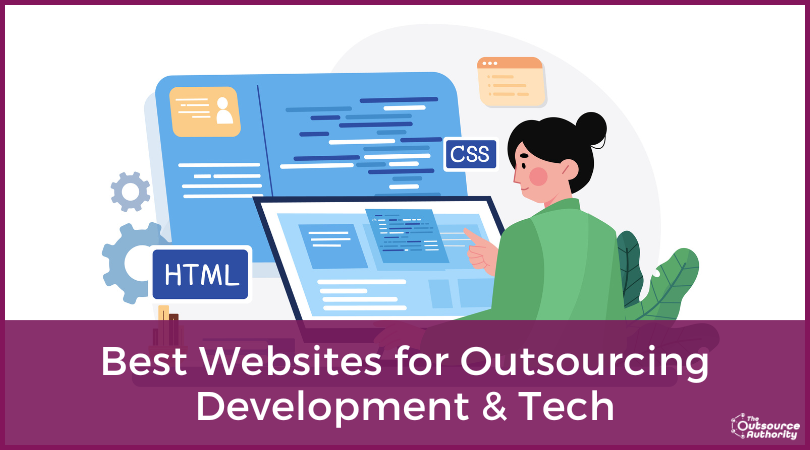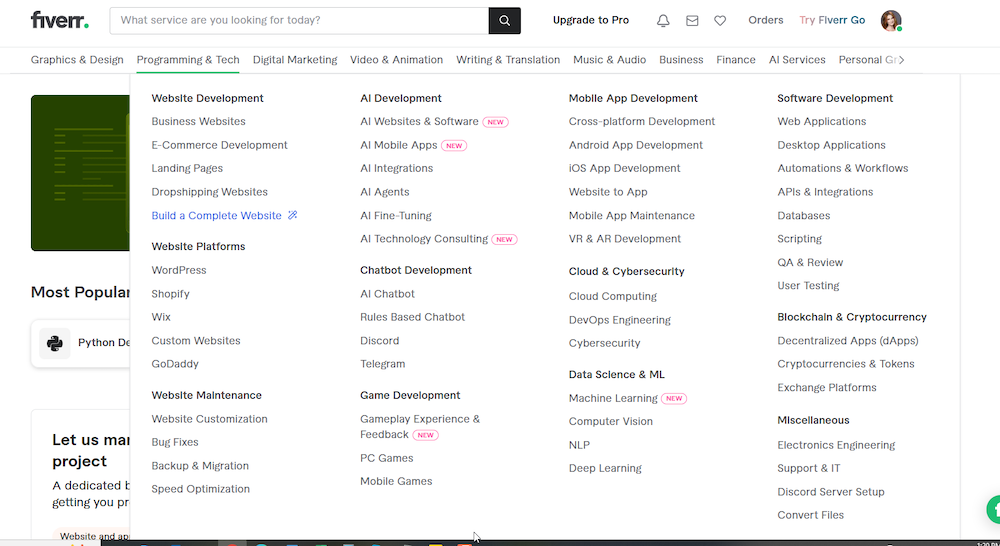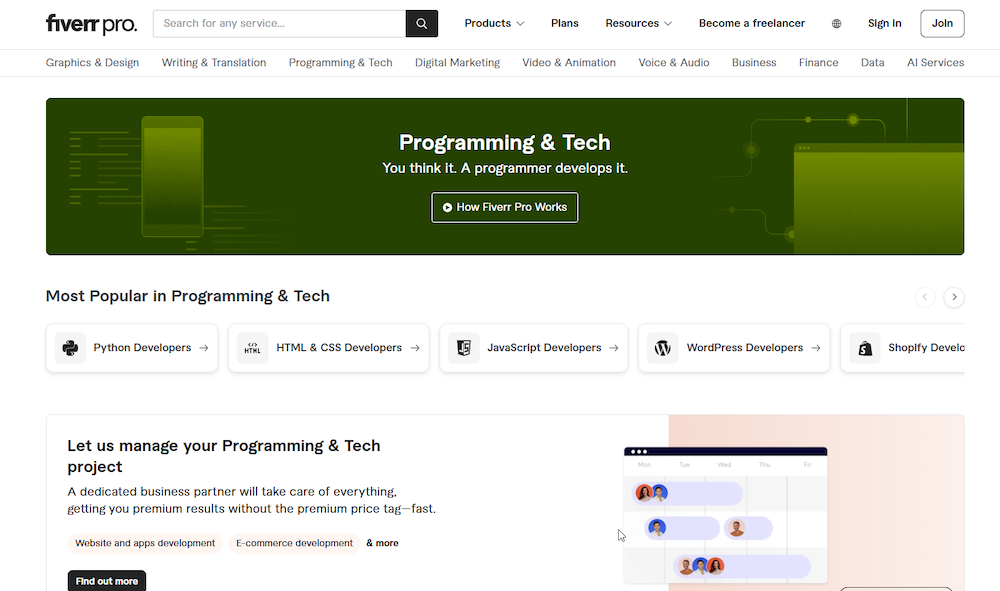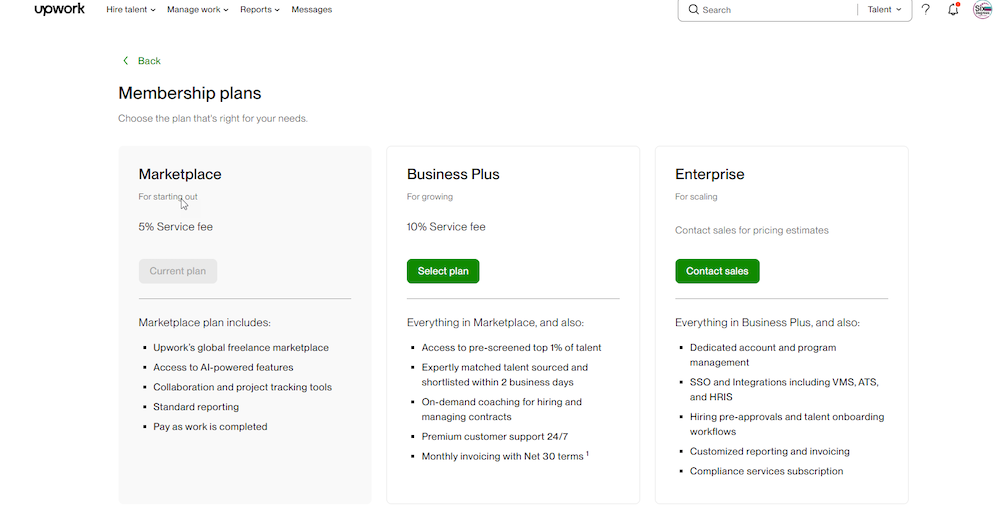Finding the Right Place to Outsource Tech & Development
Outsourcing tech work isn’t just about saving money, it’s about finding the right talent for the job. Whether you need a quick bug fix, a full-scale software build, or ongoing web development support, choosing the right platform can make or break your experience.
But with so many options out there, how do you know where to look? Do you hire a freelancer for a one-time gig, bring in a dedicated remote developer, or partner with an entire agency? Each approach has its pros and cons, and the right choice depends on your budget, project scope, and long-term needs.
In this guide, we’re breaking down the best websites for outsourcing development and tech work, from budget-friendly freelancer hubs to high-end vetted platforms. We’ll also cover key factors to consider, which countries specialize in different skills, and how to avoid common outsourcing pitfalls.
By the end, you’ll know exactly where to go for your next tech hire, without wasting time or money. Let’s get started.
Key Factors When Choosing
an Outsourcing Platform
Not all outsourcing platforms are created equal. Some are best for quick, low-cost projects, while others focus on high-end talent for complex development work. Before diving into a hiring decision, it’s important to know what to look for.
Project Complexity
The size and scope of your project will help determine the best platform.
- Need a quick fix or simple coding task? A freelancer on Fiverr or Upwork might be all you need.
- Building a custom software application or enterprise-level system? A vetted developer from Toptal or an agency on Clutch is likely a better fit.
Budget & Pricing Models
Pricing structures vary by platform.
- Fixed-price projects: Ideal for small, clearly defined tasks.
- Hourly rates: Better for ongoing work or when the scope isn’t fully mapped out.
- Retainer-based hiring: Useful for businesses needing long-term developer support.
💡 Tip: Cheaper isn’t always better. If a project is critical to your business, investing in quality saves money in the long run.
Talent Vetting & Quality Control
Some platforms allow anyone to sign up, while others rigorously vet freelancers.
- Open Marketplaces: Fiverr, Upwork, and Freelancer let anyone list their services, so filtering by reviews and portfolios is key.
- Vetted Talent Platforms: Toptal, YouTeam, and Codeable ensure you’re hiring proven experts but at a higher cost.
Time Zones & Communication
Outsourcing gives you access to global talent, but time zones can impact workflow.
- If real-time collaboration is important, consider hiring within 3-5 hours of your own time zone.
- Platforms like Turing and YouTeam specialize in matching developers within preferred time zones.
Security & Dispute Resolution
- Look for escrow payment protection to ensure developers are only paid when work is delivered.
- Check the platform’s dispute resolution policies in case issues arise.
Talent Vetting & Quality Control
Not all outsourcing platforms have the same level of freelancer quality control. Some allow anyone to sign up, while others offer a curated selection of highly skilled professionals. Understanding how different platforms vet their talent can help you make informed hiring decisions.
Types of Talent Marketplaces
- Open Marketplaces – Fiverr and Upwork allow anyone to offer services, meaning the quality varies widely. To find the best freelancers, filtering by reviews, ratings, and past work is essential.
- Premium Talent on Open Platforms
- Fiverr Pro offers hand-vetted experts in various fields, ensuring top-tier service. These freelancers undergo a review process to prove their expertise. Visit Fiverr Pro
- Upwork Expert Vetted gives access to freelancers who have undergone a rigorous screening process, demonstrating high-level skills and professionalism. This level is available through Upwork Business Plus or higher. Explore Upwork Expert Vetted
- Dedicated High-End Platforms – If you need elite-level developers or tech professionals, platforms like Toptal, YouTeam, and Codeable specialize in sourcing pre-screened, highly experienced professionals. These platforms often have stricter entry requirements and higher price points.
Choosing the Right Level of Vetting
- If you need a budget-friendly option, stick with Fiverr or Upwork but carefully vet freelancers based on reviews and portfolios.
- If you want higher-end talent without leaving these platforms, Fiverr Pro and Upwork Expert Vetted are great middle-ground solutions.
- If you need highly specialized or enterprise-level talent, platforms like Toptal and YouTeam provide pre-vetted experts but at a premium cost.
💡 Tip: You don’t have to go straight to Toptal to find high-quality talent. Fiverr Pro and Upwork’s Expert Vetted tiers provide access to top professionals at potentially lower costs.
Best Websites for Outsourcing
Development & Tech
When it comes to outsourcing development and tech work, the platform you choose makes a big difference. Some are better for small, one-time projects, while others specialize in long-term or enterprise-level work. Below are the best platforms for hiring freelance developers, engineers, and IT professionals.
Fiverr Pro
- Best for: Small-to-medium development tasks, WordPress customization, AI automation.
- How it works: Fiverr’s Pro marketplace features hand-vetted professionals for higher-quality work.
- Pros: Quick hiring process, clear pricing, wide range of skills available.
- Cons: Prices vary significantly; requires filtering to find top-tier talent.
Upwork Expert Vetted
- Best for: Mid-to-large projects requiring highly skilled, pre-vetted developers.
- How it works: Freelancers undergo a rigorous screening process before earning Expert Vetted status.
- Pros: Large talent pool, secure payments, hourly or fixed-rate options.
- Cons: Higher service fees compared to Fiverr; requires time to screen applicants.
Toptal
- Best for: Enterprise-level projects needing top 3% of software engineers and designers.
- How it works: Strict application process—only highly skilled developers make it onto the platform.
- Pros: High-quality professionals, tailored project matching.
- Cons: More expensive than general freelancer platforms.
Turing
- Best for: Companies looking to hire remote engineers on demand for ongoing projects.
- How it works: Uses AI to match companies with pre-vetted developers who fit their project needs.
- Pros: Access to top developers worldwide, streamlined hiring process.
- Cons: Requires longer-term commitment, less flexibility for short-term needs.
Codeable
- Best for: Businesses needing WordPress development, including theme customization and plugin development.
- How it works: Connects clients with pre-screened WordPress developers who specialize in custom solutions.
- Pros: Guaranteed WordPress expertise, fair pricing model.
- Cons: Higher rates than general freelancer sites.
Gun.io
- Best for: Companies looking for top-tier developers without a lengthy hiring process.
- How it works: Matches companies with pre-vetted software engineers for both short- and long-term projects.
- Pros: Fast hiring, strong quality control.
- Cons: More expensive than open marketplaces like Fiverr and Upwork.
Arc.dev
- Best for: Businesses needing long-term remote developers for ongoing projects.
- How it works: Offers both full-time and freelance engagements, with a trial period to test hires before committing.
- Pros: Quality assurance, trial period for risk-free hiring.
- Cons: Not ideal for one-time projects or short-term work.
PeoplePerHour
- Best for: Startups and small businesses needing hourly-based development work.
- How it works: Uses a certified work history to help businesses find the best developers for short-term gigs.
- Pros: Hourly model, flexible pricing.
- Cons: Smaller talent pool compared to Fiverr and Upwork.
Best Websites for Full
Development Teams & Agencies
For larger projects requiring a dedicated development team, working with an outsourced agency can provide higher efficiency, project management support, and long-term reliability. These platforms connect businesses with pre-vetted teams that specialize in software development, web & mobile apps, and enterprise solutions.
Clutch.co
- Best for: Finding top-rated development agencies with verified client reviews.
- How it works: Clutch ranks agencies based on past projects, industry expertise, and client feedback.
- Pros: Verified case studies, advanced search filters, transparent pricing estimates.
- Cons: Not a freelancer platform—better for businesses with higher budgets.
YouTeam
- Best for: Hiring pre-vetted software development firms for long-term projects.
- How it works: Matches businesses with outsourced development teams from Eastern Europe and Latin America.
- Pros: High-quality engineers, strong vetting, good for scaling dev teams quickly.
- Cons: More expensive than hiring freelancers directly.
Turing
- Best for: Companies looking to hire remote engineers on demand for ongoing projects.
- How it works: Uses AI-powered talent matching to connect businesses with pre-vetted developers.
- Pros: Highly skilled professionals, ideal for long-term projects.
- Cons: Requires longer-term commitment, not great for short-term tasks.
Arc.dev
- Best for: Companies needing full-time or contract remote developers with a trial period to test fit.
- How it works: Offers pre-vetted engineers with flexible hiring models.
- Pros: Risk-free trial, high-quality engineers, strong technical assessments.
- Cons: Not as budget-friendly as hiring directly from Upwork or Fiverr.
Best Websites for Specific Tech Niches
Not every outsourcing platform is built for general development needs. Some specialize in specific tech fields like virtual assistance, AI consulting, mentorship, or WordPress development. If your project requires highly specialized expertise, consider these niche platforms.
OnlineJobs.ph (Best for Virtual Assistants & Tech Support)
- Why? Specializes in Philippine-based talent, known for affordability and strong English skills.
- Best for: Hiring remote tech assistants for IT support, data entry, customer service, and admin tasks.
- Pros: Direct hiring, lower costs than Upwork/Fiverr, dedicated long-term support.
- Cons: Requires manual screening, no built-in project management tools.
PeoplePerHour (Best for Small One-Time Tech Jobs)
- Why? A good alternative to Fiverr for European-based talent in development and IT services.
- Best for: Quick fixes, minor bug repairs, WordPress maintenance, and other hourly-based tech tasks.
- Pros: Hourly work model, flexible pricing, localized European talent.
- Cons: Smaller talent pool than Fiverr or Upwork.
CodeMentor (Best for Learning & Mentorship)
- Why? Focuses on one-on-one mentorship for developers needing expert guidance.
- Best for: Startups or junior developers looking for code reviews, debugging help, and AI/machine learning guidance.
- Pros: Direct access to industry experts, on-demand programming support.
- Cons: More costly than hiring a regular freelancer for project execution.
Lemon.io (Best for Pre-Vetted Remote Developers)
- Why? A curated network of pre-vetted remote developers, similar to Toptal but more affordable.
- Best for: Businesses needing high-quality remote developers for software, AI, and automation projects.
- Pros: Quick access to experienced engineers, cost-effective compared to Toptal.
- Cons: Limited number of freelancers, not ideal for small, short-term gigs.
Best Countries for Tech Talent
While platforms like Fiverr, Upwork, and Toptal give access to global talent, certain countries have built strong reputations in specific areas of tech outsourcing. If location-based factors like time zone, pricing, or cultural fit are important to you, here’s where to look:
India
- Best for: Software development, backend engineering, mobile apps.
- Why? India has one of the largest IT workforces, offering cost-effective services in development, AI, and cybersecurity.
- Pricing: $15–$40 per hour for skilled developers.
- Pros: Large talent pool, affordable rates, strong English proficiency in tech fields.
- Cons: Time zone differences can be challenging for US-based businesses.
Philippines
- Best for: Virtual assistance, IT support, web design.
- Why? The strong English-speaking workforce and familiarity with Western business culture make it a top choice for support roles.
- Pricing: $8–$25 per hour.
- Pros: Low cost, reliable work ethic, good for long-term remote hires.
- Cons: More suited for support-based tech roles rather than high-level engineering.
Ukraine
- Best for: Software engineering, AI, cybersecurity.
- Why? Ukraine is known for highly skilled developers with strong expertise in AI, fintech, and blockchain.
- Pricing: $25–$60 per hour.
- Pros: High-quality code, good English proficiency, European time zones.
- Cons: Rates are higher than Asia, and ongoing geopolitical concerns could affect long-term work stability.
Eastern Europe (Poland, Romania, Serbia, Bulgaria)
- Best for: High-end web & mobile app development.
- Why? Strong emphasis on education and engineering, with many developers working with US and EU companies.
- Pricing: $30–$75 per hour.
- Pros: High skill level, proximity to Western Europe, strong English proficiency.
- Cons: More expensive than other outsourcing regions.
Latin America (Argentina, Brazil, Mexico, Colombia)
- Best for: Nearshore outsourcing, web & mobile development, AI projects.
- Why? Many Latin American developers work US hours, making them a great choice for companies needing real-time collaboration.
- Pricing: $25–$65 per hour.
- Pros: Same/similar time zones as the US, solid technical education, bilingual talent.
- Cons: Pricing is not always cheaper than Eastern Europe or Asia.
What to Look for When Hiring
Tech Talent Online
Finding the right freelancer or agency isn’t just about picking a well-rated profile. The best outsourcing results come from knowing how to evaluate candidates properly before making a hiring decision.
Key Factors to Assess
- Experience & Portfolio
- Look beyond the number of years and focus on relevant project experience in your industry.
- Review past work samples, GitHub repositories, or live websites they’ve developed.
- For AI, cybersecurity, and backend development, check for problem-solving abilities in real-world applications.
- Client Reviews & Ratings
- A high rating is great, but pay attention to detailed feedback, not just the overall score.
- Look for repeat clients—that’s a strong indicator of reliability.
- Red flags: Multiple complaints about missed deadlines or poor communication.
- Communication & Availability
- Ensure they are responsive and clear in their messages before hiring.
- Confirm if they align with your time zone or have reasonable overlap for meetings.
- If working on a long-term project, gauge their commitment level to ongoing support.
- Technical Skills & Certifications
- Check for certifications or industry credentials, especially in software engineering, AI, and cybersecurity.
- Some platforms allow for coding tests and verified skill assessments—use these as a reference.
- Ask technical questions or request a small paid test project before committing to a major contract.
- Pricing & Payment Structure
- Compare rates across different platforms to ensure you’re getting a fair deal for the quality offered.
- Clarify whether they charge hourly, per project, or milestone-based payments.
- Avoid ultra-low pricing—it often signals lack of experience or poor quality work.
- Trial Period or Money-Back Guarantee
- Some platforms like Arc.dev and Toptal offer trial periods to test hires before committing.
- On Fiverr and Upwork, discuss cancellation policies and refund options before placing an order.
- If hiring outside of a platform, ensure a clear agreement on work scope and deliverables.
How to Vet Developers Before Hiring
Even with the right platform and a solid job posting, hiring the right developer requires careful vetting. Whether you’re hiring for a small project or a long-term engagement, taking the right steps before committing can save you time, money, and frustration.
Step 1: Review Previous Work & Case Studies
- Look for live projects, GitHub repositories, or portfolio samples that match your needs.
- If hiring for AI, cybersecurity, or backend work, ask for demos or problem-solving examples.
- Check whether their past work aligns with your industry and technology stack.
Step 2: Ask About Experience in Your Industry
- A developer may be skilled but unfamiliar with your specific business needs.
- If you’re hiring for eCommerce, SaaS, or fintech, look for past experience in those fields.
- Ask for case studies or specific examples of problem-solving within your niche.
Step 3: Test with a Small Paid Task
- Before committing to a large project, assign a short test task to assess skill level and communication.
- Keep it closely related to the actual work they’ll be doing.
- Example: If hiring for WordPress development, ask them to fix a minor issue on a test site.
Step 4: Set Clear Expectations & Milestones
- Define deliverables, deadlines, and communication frequency before starting.
- Platforms like Upwork, Toptal, and Arc.dev provide built-in milestone payments.
- If hiring outside of a platform, consider using escrow services for payment security.
Step 5: Ensure Post-Project Support (If Needed)
- If you need ongoing support or bug fixes, confirm whether the developer offers maintenance options.
- For long-term projects, discuss future availability and preferred contract terms.
- On platforms like Toptal and Turing, developers are often placed in long-term roles, so plan accordingly.
Next Steps
👉 Want help finding and managing top freelancers? Schedule a Consultation today.
Outsourcing doesn’t have to be overwhelming, with the right approach, you can find top-tier developers without the hassle.







